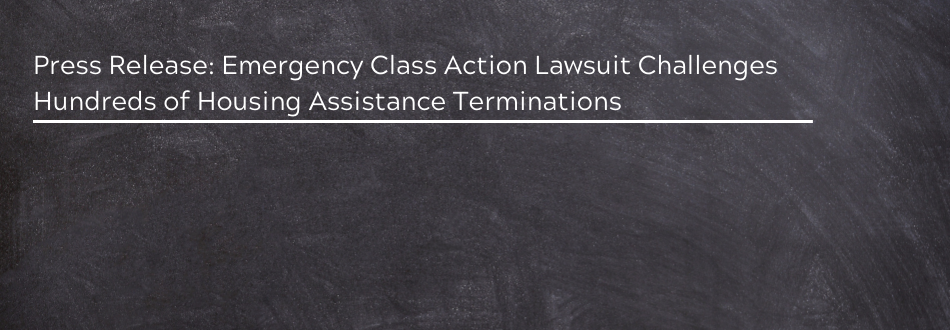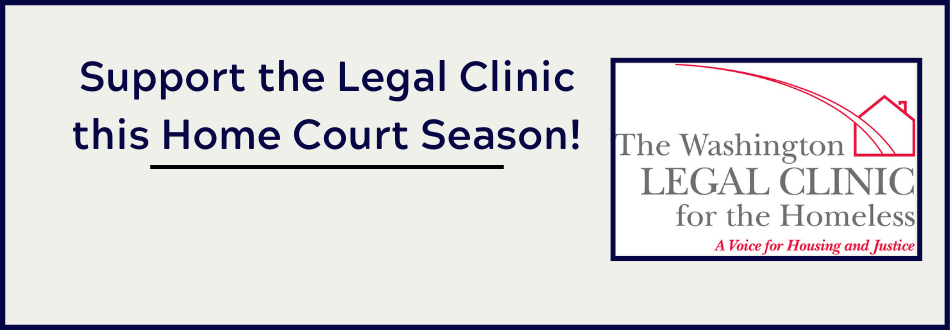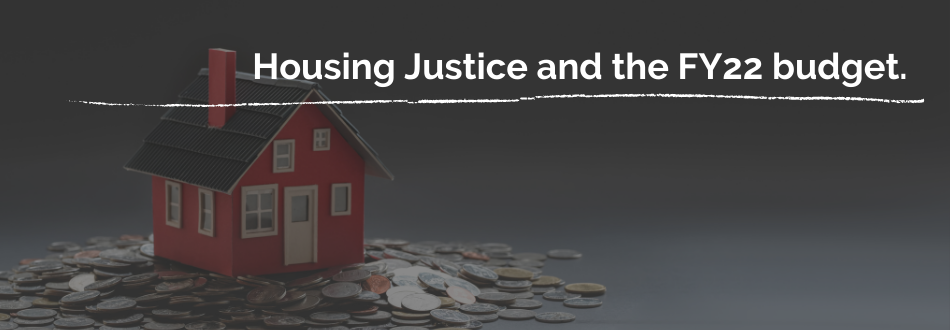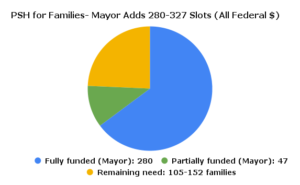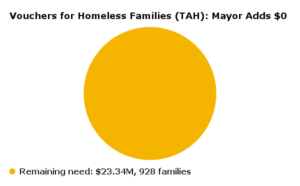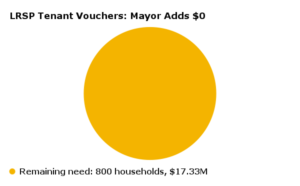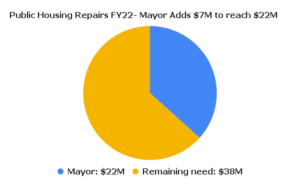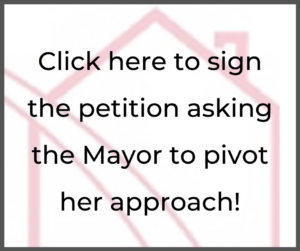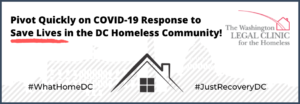Media Contacts: Allyson Boucher and Renata Aguilera-Titus
Email: ABoucher@ChildrensLawCenter.org and renata@legalclinic.org
Emergency Class Action Lawsuit Challenges Hundreds of Housing Assistance Terminations
Washington, D.C. – October 25, 2024: Children’s Law Center, The Washington Legal Clinic for the Homeless, and three prominent D.C. law firms filed a class action lawsuit this week with the D.C. Office of Administrative Hearings, requesting emergency relief for over 800 D.C. families facing an inevitable loss of housing due to the District’s unlawful mass terminations in the rapid re-housing program. The class action, believed to be the first of its kind in this forum, challenges the District’s refusal to provide families with an opportunity to be considered for an extension in the rapid re-housing program. The case has been filed on behalf of Angel Gregory, Sierra Moore, Britne Thomas and a class of similarly situated impacted families.
Last spring, the D.C. Department of Human Services (DHS) announced that it would no longer provide an opportunity for extensions in rapid re-housing, as the law requires, and instead would terminate more than two thousand families from the program, no matter their circumstances. In April through June of 2024, DHS issued over 800 terminations (known as Notices of Program Exit) to families in rapid re-housing for reaching an alleged time limit, with no chance to be considered for an extension. The notices informed each recipient that extensions would not be considered based on DHS’s assertion that it did not have sufficient funding to issue extensions. This lawsuit challenges the legality of DHS’s decision to deny wholesale an entire class of families in rapid re-housing the opportunity to be considered for extensions in the program without consideration for their individual circumstances as required by statute. The case also asserts that DHS did in fact have funding to provide extensions yet chose, arbitrarily and capriciously, not to consider individual extensions.
Rapid re-housing is a program that provides rental assistance and case management services to people exiting homelessness. The statutory goals of the program are to exit people quickly from homelessness into housing and then to establish and maintain stable housing for participants. Unfortunately, many families in rapid re-housing cannot afford market rent at the end of an arbitrary time limit—rents are too high and incomes are too low or the participants are unable to work due to disabilities. Without extensions, families will likely face eviction and even a return to homelessness.
“During my time in rapid re-housing, I had three different case managers and little to no support in finding long-term housing,” explains one of the plaintiffs on the case, Angel Gregory. “Then, when I got my exit letter – no one offered me options for how to apply for other housing. I don’t know what I’m going to do. My apartment would cost me more than I can afford without this support.”
“It is irresponsible, and potentially catastrophic, for the District to cut off housing assistance for over 800 D.C. families without any individualized conversations about the impact that action will have on the stability and well-being of those families,” shares The Washington Legal Clinic for the Homeless Executive Director Amber Harding. “The District does not get a free pass to violate the rights of low-income D.C. residents just because it decides to.”
Children’s Law Center Special Legal Projects Director Kathy Zeisel highlights the devastating circumstances DHS illegally chose not to consider, “One plaintiff came home with a newborn to no heat or hot water. Another had sewage streaming through the apartment, putting their child’s health in danger. In all of these cases, rapid re-housing failed to support these families in their times of need despite the promise of case management. Despite not having anyone from the program there to support our clients in resolving these urgent issues or creating a realistic path toward long-term stability as offered by the program, the District is still attempting to terminate them from housing.”
“This case is immensely important for every D.C. resident. We represent over 800 families that are facing the loss of their housing at a time when so many families cannot afford D.C. market rent. Without the rapid re-housing program subsidy, they cannot pay rent, and they’re likely to face eviction and become homeless. We’re asking the Office of Administrative Hearings to declare these Notices of Program Exit legally invalid, to retroactively reinstate all families back into the program, and to order DHS to consider our clients for extensions,” says Michelle D. Coleman, lead counsel.
Class plaintiffs are represented by lawyers from The Washington Legal Clinic for the Homeless, Children’s Law Center, and pro bono legal counsel led by Crowell & Moring partners Michelle D. Coleman and George Ruttinger, Steptoe LLP senior counsel James E. Rocap, and Combs & Taylor partner Kristen Reilly.
To read a copy of the complaint and learn more about the case, visit https://childrenslawcenter.org/RapidRehousingLawsuit.
For any residents facing eviction due to rapid re-housing terminations, call 202-328-5500 or email info@legalclinic.org.
###
About The Washington Legal Clinic for the Homeless
The Washington Legal Clinic for the Homeless, founded in 1987, envisions a just and inclusive community for all residents of the District of Columbia, where housing is a human right and where every individual and family has equal access to the resources they need to thrive. Our mission is to use the law to make justice a reality for our neighbors who struggle with homelessness and poverty.
About Children’s Law Center
Children’s Law Center believes every child should grow up with a strong foundation of family, health and education and live in a world free from poverty, trauma, racism and other forms of oppression. Our more than 100 staff – together with DC children and families, community partners and pro bono attorneys – use the law to solve children’s urgent problems today and improve the systems that will affect their lives tomorrow. Since our founding in 1996, we have reached more than 50,000 children and families directly and multiplied our impact by advocating for city-wide solutions that benefit hundreds of thousands more.
About Combs & Taylor LLP
Combs & Taylor is a boutique commercial practice that provides corporate, transactional, real estate, employment, and litigation services to companies across a broad range of industries. In supporting the public service and pro bono efforts of its attorneys, the firm is committed to making a positive impact and expanding access to legal services in the communities it serves.
About Crowell & Moring LLP
Crowell & Moring is an international law firm with operations in the United States, Europe, MENA, and Asia. Drawing on significant government, business, industry and legal experience, the firm helps clients capitalize on opportunities and provides creative solutions to complex litigation and arbitration, regulatory and policy, and corporate and transactional issues. The firm is consistently recognized for its commitment to pro bono service as well as its programs and initiatives to advance diversity, equity, and inclusion.
About Steptoe LLP
In more than 110 years of practice, Steptoe has earned an international reputation for vigorous representation of clients before governmental agencies, successful advocacy in litigation and arbitration, and creative and practical advice in structuring business transactions. Steptoe has more than 500 lawyers and other professional staff across offices in Beijing, Brussels, Chicago, Hong Kong, Houston, London, Los Angeles, New York, San Francisco, and Washington. Steptoe maintains a strong commitment to pro bono. Public service is an integral part of the firm’s history, ethos, and operations.
